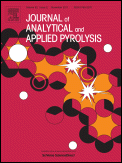
JOURNAL OF ANALYTICAL AND APPLIED PYROLYSIS
metrics 2024
Innovating Analytical Techniques in Pyrolysis Science
Introduction
JOURNAL OF ANALYTICAL AND APPLIED PYROLYSIS, published by Elsevier, stands as a premier platform for disseminating cutting-edge research in the fields of analytical chemistry, fuel technology, and chemical engineering. With an impressive impact factor and a distinguished position in the Q1 quartile across multiple categories, this journal is recognized for its rigorous peer-reviewed articles that explore the advancements in pyrolysis technology and its applications. Based in the Netherlands at Radarweg 29, 1043 NX Amsterdam, the journal has evolved since its inception in 1970 and is committed to presenting innovative methodologies, experimental results, and theoretical developments that drive the field forward. Although currently not open access, it remains vital for researchers, professionals, and students seeking to deepen their understanding and contribute to the growing body of knowledge in analytical and applied pyrolysis.
Metrics 2024
 1.15
1.15 5.80
5.80 5.70
5.70 165
165Metrics History
Rank 2024
Scopus
IF (Web Of Science)
JCI (Web Of Science)
Quartile History
Similar Journals

Izvestiya Vysshikh Uchebnykh Zavedenii Khimiya i Khimicheskaya Tekhnologiya
Advancing Knowledge in Chemistry and Chemical TechnologyIzvestiya Vysshikh Uchebnykh Zavedenii Khimiya i Khimicheskaya Tekhnologiya is a prominent academic journal dedicated to the fields of chemistry and chemical technology, published by the esteemed IVANOVSKOGO KHIMIKO-TEKHNOLOGI TSHESKOGO INST in the Russian Federation. With an ISSN of 0579-2991 and E-ISSN of 2500-3070, this journal has been a crucial platform since its inception in 1980, showcasing significant advancements and research findings, particularly in its converged periods from 1980, 1982, and 2017 to 2024. The journal is ranked Q3 in Chemical Engineering and Chemistry, reflecting its dedication to quality scholarship. Although open access options are currently unavailable, the journal plays a vital role in disseminating knowledge and fostering collaboration among researchers, professionals, and students in these critical scientific domains. Situated in Ivanovo, Russia, it continues to be a focal point for impactful research, making it an essential resource for those aiming to stay at the forefront of innovation in chemistry and chemical engineering.
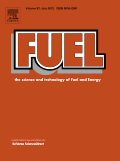
Fuel
Driving Research for a Sustainable TomorrowFuel is a premier international journal published by Elsevier Science Ltd, showcasing critical advancements and insights in the fields of chemical engineering, energy engineering, power technology, and organic chemistry. With a significant history dating back to 1922 and continuous publication from 1970 to 2025, Fuel holds an impressive position in the academic community, reflected in its top-tier rankings—Q1 in multiple categories including Fuel Technology and Chemical Engineering for the year 2023. This journal is dedicated to exploring innovative research and application of fuel technologies, driving forward the dialogue on sustainable energy solutions. Researchers and professionals alike will find Fuel to be an essential resource, providing access to high-impact articles that contribute to advancements in methodologies and applications, while navigating the complexities of global energy challenges.
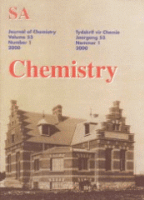
SOUTH AFRICAN JOURNAL OF CHEMISTRY-SUID-AFRIKAANSE TYDSKRIF VIR CHEMIE
Elevating South African Chemistry on the Global StageSouth African Journal of Chemistry (Suid-Afrikaanse Tydskrif vir Chemie), published by Bureau Scientific Publications, is a pivotal open-access journal that has been disseminating groundbreaking research in the field of chemistry since its inception in 1996. With an ISSN of 0379-4350 and an E-ISSN of 1996-840X, this journal serves as a vital platform for researchers and professionals seeking to share their work and engage with the global chemistry community. Recognized for its significant contributions, the journal holds a Q3 quartile ranking in the miscellaneous chemistry category as of 2023 and ranks #216 out of 408 in General Chemistry according to Scopus. The South African Journal of Chemistry is dedicated to advancing knowledge in the discipline by publishing a wide array of articles, reviews, and studies that address pertinent chemical research and applications. With open access options available since 2000, it fosters a collaborative environment, ensuring that research is accessible to all, thereby enhancing the visibility and impact of chemists' work across South Africa and beyond.
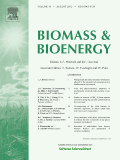
BIOMASS & BIOENERGY
Advancing Sustainable Energy SolutionsBIOMASS & BIOENERGY, published by Pergamon-Elsevier Science Ltd, is a premier academic journal focusing on the interdisciplinary fields of biomass and bioenergy research. With its impressive impact reflected in its 2023 Q1 rankings across multiple categories, including Agronomy and Crop Science, Forestry, Waste Management and Disposal, and a solid Q2 in Renewable Energy, Sustainability and the Environment, this journal stands at the forefront of advancing knowledge in renewable resources and sustainable practices. Established in 1991, it serves as a vital platform for researchers, professionals, and students to disseminate groundbreaking studies and innovative findings that shape the future of renewable energy. Though it does not currently offer open access, the journal's high ranking on Scopus, particularly its 95th percentile rank in key agricultural and environmental science categories, underscores its significance in promoting critical discourse and scientific advancements in biomass utilization and energy generation.
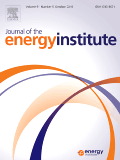
JOURNAL OF THE ENERGY INSTITUTE
Advancing Energy Solutions for a Sustainable FutureJOURNAL OF THE ENERGY INSTITUTE, published by Elsevier Science Ltd, is a leading interdisciplinary journal dedicated to the advancing fields of energy engineering and technology. With its ISSN 1743-9671 and E-ISSN 1746-0220, this journal has established a prominent reputation, evident from its impressive impact factor and strong rankings across multiple categories, achieving Q1 status in fields such as Condensed Matter Physics, Control and Systems Engineering, and Energy Engineering and Power Technology. As a pivotal resource for researchers, professionals, and students alike, the journal covers a comprehensive spectrum of topics in energy, including recent innovations in renewable energy technologies, sustainable practices, and advancements in fuel technologies. Researchers are encouraged to explore its open-access options for broad dissemination of knowledge, contributing to a more sustainable and energy-efficient future. With a converged history from 2004 to 2024, the JOURNAL OF THE ENERGY INSTITUTE remains a critical platform for cutting-edge research and development in the energy sector, promoting impactful solutions to global energy challenges.

ACTA CHIMICA SINICA
Connecting Researchers through Cutting-edge Chemical StudiesACTA CHIMICA SINICA, published by SCIENCE PRESS, is a distinguished peer-reviewed journal in the realm of Chemistry, specifically focusing on general and miscellaneous chemistry fields. Since its inception in 1982, the journal has consistently contributed to the advancement of chemical research in China and beyond, maintaining a reputable standing within the academic community, evidenced by its 2023 Scopus ranking of #197 out of 408 in its category. With a current impact factor placing it in the Q3 quartile, ACTA CHIMICA SINICA aims to disseminate innovative research findings, covering a wide spectrum of topics within the discipline. Although it is not an open-access journal, it offers various access options through institutional subscriptions, ensuring that its high-quality content is available to a broad audience. Researchers, professionals, and students alike will find this journal a vital resource for keeping abreast of developments in the field and for contributing their own findings to an engaged scientific community.
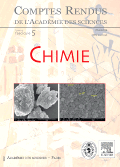
COMPTES RENDUS CHIMIE
Exploring New Frontiers in Chemistry and Engineering.COMPTES RENDUS CHIMIE, published by the prestigious Académie des Sciences in France, stands as a significant journal in the fields of chemistry and chemical engineering. With an ISSN of 1631-0748 and an E-ISSN of 1878-1543, this open-access journal has been committed to disseminating high-quality research since its transition to open access in 2020. Featuring a diverse array of studies, the journal covers innovative research trends and applications, while maintaining a Q3 category ranking in both Chemical Engineering (miscellaneous) and Chemistry (miscellaneous) as of 2023. Its Scopus rankings, positioning at #251 out of 408 in general chemistry and #169 out of 273 in general chemical engineering, highlight its growing impact within the scientific community. Authored by a global cohort of scientists and researchers, COMPTES RENDUS CHIMIE is dedicated to the advancement of knowledge and sharing insights that are vital for ongoing research and development in the chemical sciences. Located in the heart of Paris at 23 Quai de Conti, 75006, France, the journal is an essential resource for those passionate about chemistry and engineering disciplines, fostering collaboration and innovation across the world.

Solid Fuel Chemistry
Fueling the Next Generation of Chemical EngineeringSolid Fuel Chemistry is a pivotal journal published by PLEIADES PUBLISHING INC, dedicated to advancing knowledge in the fields of chemical engineering, chemistry, and fuel technology. With its ISSN 0361-5219 and E-ISSN 1934-8029, this esteemed publication has been contributing to the scientific community since its inception, covering extensive research from 1975 to 2024. Operating within the Q3 and Q4 quartiles, it holds a significant position among peers in its categories, ranked 94th in Energy & Fuel Technology and 212th in General Chemical Engineering. Although it lacks an open access option, the journal remains a vital resource for researchers, professionals, and students eager to explore innovative developments in solid fuels and their applications. The articles published in Solid Fuel Chemistry provide essential insights, facilitate collaboration, and inspire further research, making it an indispensable platform for anyone engaged in this essential field of study.
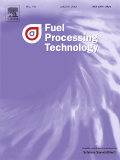
FUEL PROCESSING TECHNOLOGY
Innovating fuel technologies to power the future.FUEL PROCESSING TECHNOLOGY, published by Elsevier, is a highly regarded scholarly journal dedicated to advancing the field of fuel processing and technology. With an impressive Q1 ranking in major categories such as Chemical Engineering, Energy Engineering, and Fuel Technology, this journal serves as a vital resource for researchers, professionals, and students alike, offering cutting-edge research and comprehensive reviews since its inception in 1977. Boasting a Scopus ranking that places it within the top 10% of its field, FUEL PROCESSING TECHNOLOGY is committed to disseminating innovative findings and methodologies that are crucial for the development of sustainable fuel technologies. In line with its commitment to accessibility, the journal will transition to Open Access status starting in 2024, thereby broadening the reach and impact of valuable research. Located in Amsterdam, Netherlands, the journal is strategically positioned to foster global collaboration and dialogue, making it an essential platform for scholars dedicated to the critical challenges in energy and environmental sustainability.

RUSSIAN CHEMICAL BULLETIN
Unveiling the Future of Chemistry, One Bulletin at a Time.RUSSIAN CHEMICAL BULLETIN, published by SPRINGER, serves as a pivotal resource in the field of general chemistry, covering a wide array of topics that impact both theoretical and applied chemistry. With an ISSN of 1066-5285 and a presence since 1993, this journal provides a platform for disseminating significant research findings, practical applications, and novel methodologies within the broader chemistry community. While it currently holds a Q3 ranking in the Chemistry (miscellaneous) category and occupies the 230th position out of 408 in the Scopus rankings, its reputation continues to grow, fostering collaboration and innovation among researchers and professionals alike. Although the journal does not offer an open-access model, it is committed to making findings accessible within the academic community, ensuring that valuable insights can inform future research. With an anticipated convergence of studies extending to 2024, the RUSSIAN CHEMICAL BULLETIN remains an essential reference for those dedicated to advancing chemical science.